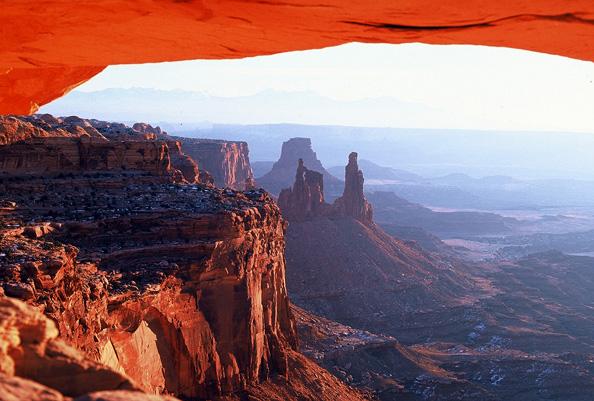Starr: This Land Is Our Land?

A view from Canyonlands National Park (Courtesy Wikimedia Commons)
November 12, 2019
At a roundtable discussion in Moab last month, Senator Mike Lee and the other senators of the Public Lands, Forests and Mining subcommittee sat down to discuss public lands policy in Utah. While Lee was correct in his statement that land is not “one single monolithic thing,” his assertion that states should manage America’s remaining open lands is flawed. In Lee’s vision, states would not control — and would likely sell — these remaining open areas, an idea that is initially laughable and then disheartening. States have regularly claimed that the federal government is “stealing” the same land that settlers violently pocketed from its original stewards. Not only does this sickening history seem to be continually and conveniently overlooked, Lee, and other states’ rights proponents, ignore the complex reality of land management. States are unfit to oversee these areas, and this ground was never theirs to take in the first place.
Efforts to protect rather than sell and develop public land are increasingly under attack. Balancing recreation with conservation is already challenging, and many of the safeguards in place have been removed at an alarming rate since 2000. It is worrying that as a senator from Utah and chairman of the public land subcommittee, Lee is encouraging the irresponsible transfer of land from the federal government to the states. Utah is a unique and beautiful state and its representatives should be the loudest cheerleaders for its protection.
Taking back land just to sell it off
Lee stated that Utah should have the opportunity to sell its “garden variety BLM land” to fund education and other public services. States manage and control trust lands in order to fund other programs, but if this were done on a larger scale, Utah’s ecosystems and recreation opportunities would be at risk. Conservation and sustainability should be the pillars of land management, but they become afterthoughts when the ultimate goal is funding. Utah has 3.4 million acres of state-controlled trust land, and they’re not held in the public trust, but rather in the trust for “12 beneficiaries.” Higher education, special education and juvenile services are a few of the recipients of the generated revenue from the land. While we absolutely should invest in essential programs like education, the revenue should come from a more sustainable stream. The mineral extraction and oil and gas leasing in trust lands are neither responsible nor reliable cashflows, especially for Utah’s rapidly growing population. Whether it be the schools, ecosystems, hunters or hikers, they each deserve better than this destructive, for-profit goal.
Public lands are a public good
The federal government manages public land for the benefit of everyone. A majority of the public land is under the direction of the BLM, the Forest Service, the National Park Service and the Fish and Wildlife Service, with billions in appropriations dedicated to keeping these lands healthy and accessible. It’s misleading for Lee and other lawmakers to claim that greater state control would better achieve what the public wants — federal management already allows for multiple uses of land. “Multiple use” of public land is mandated by law, which permits grazing, mining, recreation and other activities. This may not be the ideal, sustainable approach to land management, but it isn’t solely driven by profit from stolen ground. Lee can hold meetings and lectures about “balanced conversations,” but the fact is that state control stifles the dialogue for the sake of profit.
States don’t have the bandwidth
It’s puzzling that lawmakers believe that the small budgets of the states would be sufficient to fund the extensive work already done by federal agencies. The federal government currently controls roughly 64.9% of Utah land, and it would cost the state around $280 million annually to assume the caretaking duties, not to mention that it would lose 2,174 jobs. The state would only be able to afford these costs by leaning into coal, oil and gas development, and lawmakers need to question whether that truly aligns with what Utahns want.
Utah enjoys an exceptional array of open soil, weathered red rock and scenic elevations speckled with pinyon pine and aspen trees. It would be heartbreaking for the state to take over for the federal government only to sell out the land for profit. We simply do not have the funds to supervise such extensive ecosystems, and “local control” means that access would be suppressed as the state would be left with the option to drill, harvest and extract resources for profit. Lee and this committee should better use their platform, at the very least, to encourage sustainability and co-management of these lands with the original stewards rather than a takeover.







